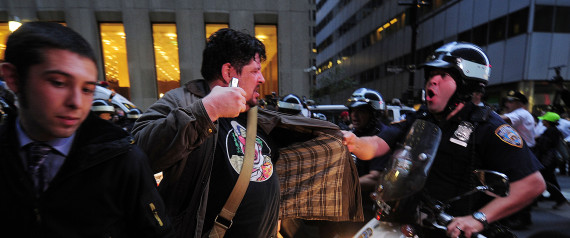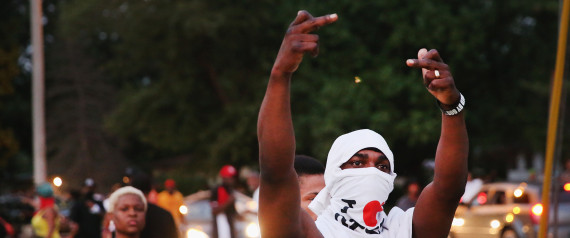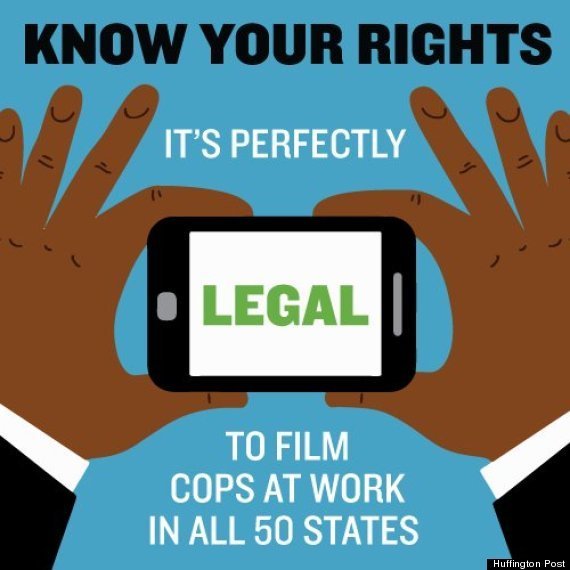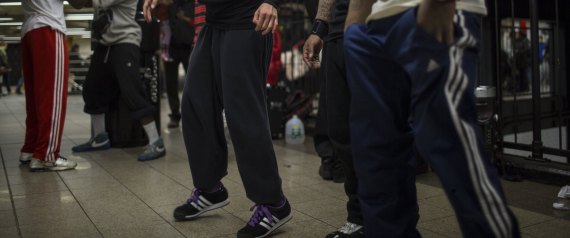As The Huffington Post's Ryan J. Reilly experienced first-hand this week, police officers often arrest people even if they're not actually committing a crime.
On Thursday night in Ferguson, Missouri, SWAT officers dispatched to respond to protests in the wake of the police killing of unarmed teen Michael Brown arrested Reilly and The Washington Post's Wesley Lowery at a McDonald's. Cops apparently determined the reporters weren't packing up their stuff fast enough. They were released without charges and given no paperwork or names of arresting officers. That's probably because what they were doing -- which at worst can be described as not showing complete deference to the officer demanding that they vacate the private establishment -- is not illegal. For what it's worth, arresting officers told them they were "trespassing in a McDonald's," which they also weren't doing.
It was a reminder that unlawful arrests happen all the time in the U.S. Here are some of the most common behaviors that get people arrested, even if they aren't breaking the law.
Disrespecting A Cop

In the simplest of terms, it's not illegal to be a jerk to a police officer, as even impolite speech is protected by the First Amendment. That doesn't mean it's a good idea, however, and there are countless instances of cops bending or violating the rights of U.S. citizens in attempts to punish them for perceived disrespect or undermining of their authority. Controversial arrests of this nature are frequently referred to as "contempt of cop." As Jerry L. Steering, a California attorney and police misconduct specialist writes on his website, these cases "typically involve the police using force upon persons (i.e. beating them) and/or falsely arresting them, and then inventing bogus and 'creative' allegations of violations" after the fact.
Imagine you are being aggressively confronted by an officer telling you to leave a public space. It is your right to be there, so you decline. The officer, upset that you are resisting his unlawful command and trying to show him up, decides that you need to be taught a lesson in obedience. So he informs you that you are being arrested, and you, knowing this is a violation of your rights, get upset. But if you lash out, you risk a charge of resisting arrest.
If you make any contact with a cop whatsoever, it could easily invite claims of assaulting an officer. Whatever happens, it will end in a headache for you, and in most cases, any attempt to hold an officer accountable for this misconduct will require a significant investment of time and money to go through the proper legal process.
Being Verbally Abusive To A Cop
You can legally curse at a cop, though as explained in the point above, that doesn't mean it won't get you arrested. If you're lucky, you might get a small settlement out of the ordeal if a judge is sympathetic to your mistreatment. If you're unlucky, however, there may be a city ordinance that can be loosely interpreted so that your use of profanity subjects you to another violation, such as disorderly conduct. While directing the language at a police officer isn't illegal in itself, using profanity in public at a certain volume or in the presence of other individuals could open you up to trouble.
Flipping Off An Officer
The courts have ruled it's perfectly legal to flip the bird at police. But again, that doesn't mean people haven't been stopped and arrested for doing so, usually on disorderly conduct or reckless driving charges. Those charges are frequently dropped, but usually not before putting the bird-flipper through a significant ordeal.

Filming Police
As we've explained ...
In recent years, there have been countless cases of police officers ordering people to turn off their cameras, confiscating phones, and, like Reilly, arresting those who attempt to capture footage of them. Despite a common misconception, it’s actually perfectly legal to film police officers on the job.

Drinking At A Bar
In 2010, Mother Jones reported on a group of Fort Worth police who arrested six people drinking at a bar for public intoxication. It may shock you to find out that it's perfectly legal to drink inside a private establishment.
Dancing On Subway Platforms
It's not illegal to perform on subway platforms and mezzanines, yet performers say they are arrested for doing so all the time. They're usually charged with "blocking pedestrian traffic" or "panhandling." This has led some performers to use subway cars themselves as the stage, which is illegal under NYC law, and can even lead to criminal reckless endangerment charges, which require an arrest and can lead to up to a year in jail.

Possessing Small Amounts Of Marijuana
In New York City, possessing small amounts of marijuana is the equivalent of a parking violation. But having it out in public view is a misdemeanor. So some police in the Big Apple have figured out a way to create criminals by stopping and frisking suspects. When they find marijuana and it gets brought out into plain sight, then it becomes an illegal and arrestable offense. The practice became so widespread that former NYPD Commissioner Ray Kelly told his officers to stop these improper arrests. Even so, the tactic persists.
In 2013, 29,927 people were arrested in New York City for marijuana possession. This is a local ordinance specific to New York City, so please act according to your city or state's marijuana laws.
